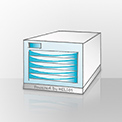HELIOS TechInfo #080
Fri, 04 Jun 2004
EtherShare 3.1/WebShare 1.0 on Red Hat Enterprise 3.0 Linux
On Red Hat Enterprise 3.0 Linux AS/ES/WS the AppleTalk kernel modules are not installed by default anymore.
As a result, not all EtherShare services can start and the system message file “/var/log/messages” will list entries for process “atalkd”:
Jun 3 11:09:45 taroon atalkd[2619]: configureInterface: socket Address family not supported by protocolJun 3 11:09:45 taroon atalkd[2619]: shutdown_if: socket Address family not supported by protocolJun 3 11:09:45 taroon atalkd[2619]: no interfaces configured, stoppedJun 3 11:09:45 taroon srvsrv[2617]: service atalkd (pid 2619) exited with status 1
You need to install the required kernel RPMS from the 3rd Red Hat Enterprise 3.0 AS/ES/WS CD (“RHEL/3 i386”) to enable AppleTalk.
Inside the “RedHat/RPMS” directory, this is either the package “RedHat/RPMS/kernel-unsupported-2.4.21-4.EL.i686.rpm” or the “RedHat/RPMS/kernel-smp-unsupported-2.4.21-4.EL.i686.rpm” package.
Depending on release date of your Red Hat Enterprise 3.0 CD set the versions can be different.
After installation of the RPM you can start EtherShare services or all HELIOS services, a reboot of the server is not required.
Note for customer compiling their own kernel
Instead of installing the binary “kernel-unsupported-2.4.21-4...” package, a new kernel could be compiled. In this case the network protocol “appletalk” needs to be turned on as a module. After this all HELIOS services will work.
Java Version for the HELIOS WebShare WebObjects Server
If you also need Java for WebShare, install from the Red Hat CD 9 ("Extra CD") the IBM Java. If you want to use WebShare with HTTPS, that Java version may not be sufficient. If you get an error message listing “Algorithm SunX509 not available”, install a SUN Java 1.4.x or newer.
Please note:
The Red Hat Enterprise 3.0 WS (Workstation) release is sufficient for all HELIOS products. The difference between WS, ES, AS are the support options, additional server services and different CPU and memory configurations.

 Enterprise Fileserver
Enterprise Fileserver
 Entwickler / SDK
Entwickler / SDK
 Handel / Industrie
Handel / Industrie
 Zeitungen / Verlage
Zeitungen / Verlage
 Fotografen / Studios
Fotografen / Studios
 Werbeagenturen / Mediendienst- leister / Druckereien
Werbeagenturen / Mediendienst- leister / Druckereien
 Video & Entertainment
Video & Entertainment
 Cloud-Zusammenarbeit
Cloud-Zusammenarbeit
 HD Color
HD Color
 Bildverarbeitung
Bildverarbeitung
 Proofs
Proofs
 WebShare Portal
WebShare Portal
 Automatisierung von Workflows
Automatisierung von Workflows
 Fileserver
Fileserver
 Pressetexte
Pressetexte  Videos
Videos  Newsletter
Newsletter  Veranstaltungen
Veranstaltungen